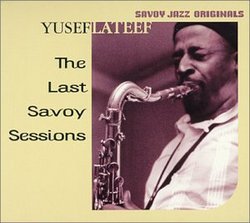Superbest, super-best!
ivomorre | JEREZ DE LA FRONTERA, CADIZ Spain | 09/21/2001
(5 out of 5 stars)
"I'd give these two records all the stars in heaven. This is no jive, no show business. First of all, there is Yusef's sound on tenor. Dark, raspy, passionate, reminding that of Harold Land, to whom he has apparently been listening. (Land briefly came into prominence in 1955 with Clifford Brown-Max Roach.) This sound stuck with me since the late 1950's, but surprisingly the only Lateef record of his I ever bought before was A Flat, B Flat and E in which he explores the blues from different stylistic and instrumental viewpoints. Little did I realize how profound a musician this man is and how great an improvisator. Stylistically his foundation is bebop and I find him strongly related to Sonny Stitt (which is no mean compliment), but Yusef's music has a strong spiritual qualitity, whereas Stitt was a brilliant showman. The word "haunting" perhaps best describes his music, whether he plays tenor sax, flute or oboe. It has immense originality, even when based on traditional material such as the blues or Rhythm changes. Valse Bouk is a fast blues waltz with a riff-like theme consisting of four notes - major 6th, tonic, minor 3rd and major 3rd. The blowing is tremendous! And his ballad playing (e.g. on Can't Help Loving that Man of Mine) is deeply moving.All the sidemen are excellent, but there are two which I would like to particularly mention. There is Bernard McKinney on euphonium (a tenor instrument of the tuba family and whose sound strongly resembles a trombone's but is less brassy). He plays very beautiful lines and his mellow sound makes you wonder why no one else plays this marvellous instrument. The other is Wilbur Harden on flugelhorn (and on balloon!), a very fluent, full-toned player who unfortunately left us too soon. Enough words. Buy this one."
Very nice recordings
Joerg Colberg | Northampton, MA USA | 06/26/2000
(4 out of 5 stars)
"There are a few jazz musicians who showed that jazz music is not restricted to using standard instruments. Besides the saxophone and the flute, Yusef Lateef used an oboe and, later, arabic and africanic instruments. On this compilation, which features music recorded in the late 1950s, Yusef Lateef predominantly plays flute and tenor saxophone. The overall level of experimentation with different sounds is somewhat low. This is not intended to be any sort of criticism, though. Those who are interested in listening to all the non-standard instruments should listen to the magnificent live recordings at the "Pep's". Here, Yusef Lateef shows what a great standard musician he was (and still is). The sets comprise a few standards and many original compositions, and both his play on saxophone and on flute are very powerful and passionate. The styles range from blues to bop, and every fan of jazz done at that time will like listening to these sets very much."
Mind-bending!!!!
D. Magnani | america | 09/06/2001
(4 out of 5 stars)
"This CD was my first Yusef Lateef purchase, and it is an exciting and adventurous addition to any jazz collection (although Lateef has repeatedly asserted that he doesn't play jazz). Lateef's lyrical tone, whether he's playing the sax or the flute, is one of a kind. In particular, I enjoy the flute pieces, notably "Angel Eyes" and "Poor Butterfly." If you are looking for something a little different, I highly recommend this CD. Peace"


 Track Listings (10) - Disc #1
Track Listings (10) - Disc #1